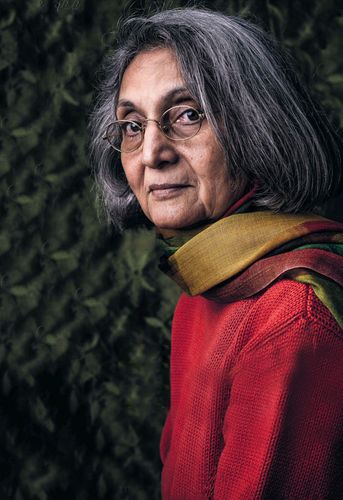On October 2, Zorba the Buddha, an open faith spiritual centre in Gurgaon, hosted a “date” with Ma Anand Sheela, who was the personal secretary of Guru Bhagwan Shree Rajneesh (Osho) from 1980 to 1985. During a pre-dinner talk, the moderator asked about the famous spiritual guru’s take on sex, marriage and polygamy. Sheela, 69, sat slightly bent on the stage, wrapped in a green shawl with her grey hair styled into an elegant bob. There was a smiling portrait of Osho in the backdrop, garlanded with marigolds. Although known for her sharp wit—she was once called the “tigress of the two-minute television news spot”—that day, she seemed uncharacteristically mellow. “You take responsibility for your actions...,” she said. “Bhagwan is not interested in your daily problems. Leave him alone.”
And what about “power”, the moderator, Ashwin Bharti, asked. Sheela jumped up from her seat. With an eerie smile, her eyes glinting with excitement, she stared down at her enraptured audience. “Look at me,” she said. “I am Osho’s power. Have a good look at me. It is called the power of love.” The crowd roared and whistled; they had got their money’s worth. In this instance, Rs 2,500 for a sampling of Osho’s work, a talk, a Q&A session and dinner with Sheela, the linchpin of the 2018 blockbuster documentary Wild Wild Country, on Osho and his improbable commune in Oregon.
But what the participants had not bargained for was a possible cameo in an upcoming Netflix documentary on Sheela herself. When they were informed that there was a videographer shooting the show, some walked out of the hall feeling short-changed and wanting a refund. Most did not seem to mind. “Ma Anand Sheela is like Osho’s first wife, you know,” said a participant, who was never really a follower of the godman’s teachings but was a fan of Wild Wild Country. “It is great entertainment,” he said. “But you cannot believe anything of what she says. It is like listening to Modi.” Sheela, who was born in Gujarat as Sheela Ambalal Patel, was introduced by her father to “Bhagwan” Rajneesh in Bombay in 1967, just as she was about to leave to the US for further studies. She apparently got lost in his eyes in that first encounter. By mid-1981, she had bought the 64,229-acre Big Muddy Ranch at the Wasco and Jefferson counties in Oregon to form the Rajneeshpuram commune. At its peak, it hosted 15,000 spiritual seekers from around the world—a hippie carnival that turned into a dangerous, aggressive cult. And when it crashed and burnt, Sheela was exposed as the “mastermind” behind the movement—a sort of manager, spokesperson and chief of staff of the Rajneesh empire. Her operating style during her four years in Oregon was perceived as Machiavellian. She was accused of arming the commune members with semi-automatic weapons, drugging homeless people, attempting to murder Osho’s doctor and plotting to kill an Oregon investigative reporter. “You accept a crown, be ready for the guillotine,” Sheela said in a recent interview with Karan Johar, organised by the NGO Humans For Humanity and Sipping Thoughts, a women-centric talk show. The two organisations were responsible for bringing Sheela to India, 34 years after she left the Osho ashram in Pune.
Evidently, the Indian audience wants more of her trademark, flame-throwing punchlines from the 1980s. The internet is full of listicles of her “wild wild” quotes. “What can I say? Tough titties” tops the lot. Ever the slick provocateur, she could twist any uncomfortable question into a brazen celebration of the self. Which is how she has tackled questions during her India tour as well. But those quotable quotes are not as fiery or egomaniacal as they used to be. Now, they are more about self-love and self-help. A few of her tepid one-liners during Johar’s show which generated hearty applause were: “I am a free woman”; “Love has no reason, if love has [a] reason it is not love. It is a bargain”; “I don’t push the buck around”; “You create your own rainbow” and “You too are divinity”. Some titillating bits included Sheela offering Johar post-coital Swiss chocolates, admitting how she never meditated or had sexual relations with Osho, and how she had “personally paid for 96 Rolls Royces”.
But often, one could see flashes of alarm and muted outrage. After Johar’s interview, when an audience member asked her about the allegations of mass poisoning and fighting with the local residents of Antelope in Oregon, she recalled—almost with a death-glare—how the Rajneeshees were even blamed for a volcano that exploded there. “I have nothing to do with these accusations.... This information you have is not correct,” she said. There was a bit of gaslighting, too. At the pre-dinner session on October 2, when a woman wondered how her great love for Bhagwan could allow for violence, Sheela defended her actions as self-protection at a time of spiraling negativity. “But I have a question for you,” Sheela shot back. “Tell me this, you are such a pretty girl, but why do you look so sad?” She ended the cross-questioning with an advice: “Be positive, otherwise you will become suicidal. Yes, that is where depression starts.” That was the last question of the evening.


